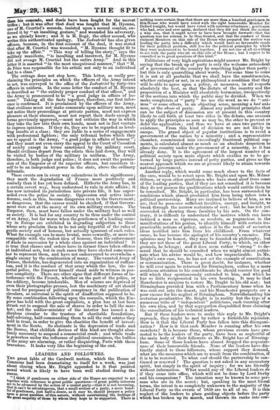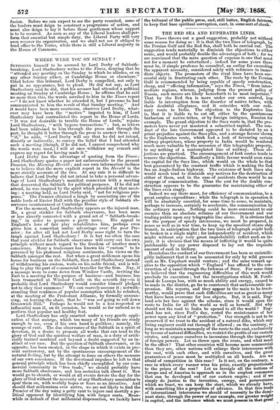LEADERS AND FOLLOWERS.
TILE great fable of the Cardwell motion, which the House of Commons had been dramatizing to itself for a week, was just about closing when Mr. Bright appended to it that .pointed
moral which is likely to have been well studied during the recess.
"I think if gentlemen on either side of the House are expected to act together with reference to great public questions—if great public interests are to be advanced by the action of a united party—that it is not becoming, that it can't be advantageous, that a small section of a party, a mere hand- ful of gentlemen, just half-a-dozen, as it may be, should prepare a policy upon a great question of this nature, without ascertaining the feelings of the great majority of those by whom they hope to be supported. There is nothing more certain than that there are more than a hundred gentlemen in this House who would have voted with the right honourable Member for Oxford tonight, but would have voted with extreme reluctance ; gentlemen who had, over and over again, declared that they did not think the motion a wise one, that it ought never to have been they forward—that the question was too solemn to be thus treated, and that the conduct of those eminent Members on this side of the House who prepared the motion was leading the party into a difficulty which would have no favourable result for their political position, still less for the political principles by which they were understood to be bound together. I am not one at all unwilling to act with the party who sit on this side of the House ; but I expect to be consulted as to great questions of this kind."
Politicians of very high aspirations might answer Mr. Bright by saying that the break up of party is only the welcome antecedent of a government of the country by something higher than party ; but this is only quarrelling about words. For some time to come it is not at all probable that we shall have the constituencies, whether enlarged or not, in so philosophical a condition that they will be able to agree upon a policy, or measures, in all respects absolutely the best, so that the dictate of the country and the proposition of a Minister will absolutely harmonize, irrespectively of the sections into which the public may be divided. When we make complaints of " party" we use the word as we do " ani- mus" or some others, in an objecting sense, meaning a bad ani- mus, or the abuse of party. Almost any political principles that can be the subject of discussion are at present in this country likely to call forth at least two sides in the debate, one anxious to apply the principles as soon as may be, the other to prevent or defer the application ; and thus we have at once two parties in existence. From this kind of division we are not likely to escape. The grand object of popular institutions is to avoid a government of the nation by a minority ; and a representative chamber, comminuted into exceedingly fractional political seg- ments, is calculated almost as much as an absolute despotism to place the country under the government of a minority, as it has already done. It is the agreement of the largest number of a political society upon main objects which enables us to be go- verned by large parties instead. of petty parties, and gives us the nearest approach which we are at present likely to attain towards national government.
Another reply, which would come much closer to the facts of the case, would be to retort upon Mr. Bright and upon Mr. Milner Gibson, or upon other gentlemen who have stood aloof from some of the leading parties, that if they are not consulted it is because they do not possess the qualifications which would entitle them to be consulted. Mr. Bright, in particular, has been surrounded by conditions which almost precluded him from being taken into a political partnership. Many are inclined to believe of him, as we are, that he possesses sufficient faculties, energy, and insight, to break through the narrow restraints of sect; but he has not yet succeeded in showing those faculties by his acts. On the con- trary, it is difficult to understand the motives which can have induced a man so vigorous, so resolute, so pugnacious in the manifestations of his genius, to identify himself with certain im- practicable notions of policy, unless it be the result of sectarian ideas instilled into him from his childhood. From whatever cause, he has become the apologist of his country's enemies. His opinions may be honest, they may be founded on philosophy, but they are not those of the great Liberal Party, to which, on other grounds, he belongs ; and it does seem rather " strong " to de- mand that he should be consulted when we might almost antici- pate what his advice would be, and how impracticable. In Mr. Bright's own case, too, he has not set the example of consultation or communication. There is great doubt, for instance, whether he will ever again be returned for Birmingham, unless by a more assiduous attention to his constituents he should recover the good will which they spontaneously extended to him, and which he has so little reciprocated in his own bearing. It may be that Manchester is anxious to restore Mr. Bright to his old seat; but Birmingham provided him with a Parliamentary home when he was sent out into the desert, and his Manchester prospects are a poor excuse for his neglect of Birmingham. Notwithstanding his sectarian peculiarities Mr. Bright is in reality but the type of a numerous tribe of " independent" politicians, each running after his own idea, and by that segregation disqualified from claiming the consultation of his technical leaders.
But if these leaders were to make this reply to Mr. Bright's reproach, they might be met by rather a formidable rejoinder. How is it that the Liberal Party has fallen into this disorgani- zation ? How is it that each Member is running after his own crotchets ? It is because those, whom previous events have pro- moted to be the leaders of the party, have been as neglectful of the main body of their followers as Mr. Bright has of Birming- ham. Some of those leaders have almost dropped the acquaint- ance of their honourable friends. , None of the leaders have dis- tinctly stated to those followers, whose support they demand, what are the measures which are to result from the combination, if it is to be restored. To what end should the partnership be con- tinued or renewed ? The question is not asked in any accusatory spirit, but simply in the spirit of inquiry ; for we are literally without information. What would any of the Liberal leaders do if they came into office, which will not be done by Lord Derby and his companions ? The intention may be known to some per- sons who are in the secret ; but, speaking in the most literal terms, the intent is as completely unknown to the majority of the Liberal Party as the events of 1859 are to all of us. It is this neglect of the leaders to place guiding objects before the party which has broken up its march, and thrown its ranks into oon- fusion. Before we can expect to see the party reunited, some of the leaders must deign to construct a programme of action, and must also deign to lay it before those gentlemen whose support is to be secured. As soon as any of the Liberal leaders shall per- form that essential but simple duty, the Liberal Party will very soon recover its organization, and we shall not see it obliged to lend office to the Tories, while there is still a Liberal majority in the House of Commons.



























 Previous page
Previous page